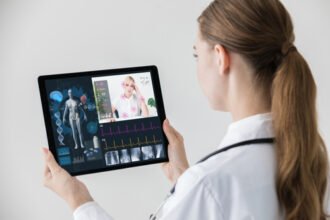The American Association of Colleges of Nursing reports that around 203,000 new nurses are created each year. New nurses need to cope with a number of new technological trends.
The advent of technology has revolutionized countless sectors, and medical and nursing education is no exception. An essential transition from conventional to digital platforms has not only expanded the scope of knowledge but also enriched the learning experience. The following article delves into the profound effects of technology on medical, nursing, and broader healthcare education.
The Technological Impact on Basic Education
A significant impact of technology is seen in the area of basic education for medical and nursing students:
- First, virtual learning environments have replaced physical classrooms, making education more accessible than ever.
- Second, electronic health records (EHRs) have become a significant part of the training process, promoting a practical, hands-on approach to learning.
- Third, advancements like virtual and augmented reality have transformed the way students learn complex procedures, fostering a culture of ‘learning by doing.’
Virtual Learning Environments
Virtual learning platforms have opened up a world of opportunities for aspiring medical and nursing professionals. These digital classrooms not only transcend geographical barriers, but also accommodate a variety of learning styles, making education more inclusive.
For instance, students can now revisit recorded lectures at their convenience, promoting better comprehension and retention. The challenge, however, lies in maintaining interpersonal connections in a remote learning environment.
Electronic Health Records
EHRs play an integral role in modern medical and nursing education. They provide a hands-on approach to understanding medical histories, enabling students to develop a comprehensive perspective of patient care.
Yet, EHRs also come with the challenge of maintaining data privacy. Future healthcare professionals must be trained not only in utilizing this tool but also in upholding the highest standards of information confidentiality.
Influence of Telemedicine in Education
The advent of telemedicine has brought about a remarkable change in the method of teaching healthcare. Medical and nursing students now have the opportunity to observe and interact with patients from various parts of the world without leaving their classrooms. This virtual interaction provides a broader spectrum of exposure to different diseases and treatment approaches, thereby enriching their understanding and competence.
However, it requires stable and high-speed internet connectivity, which might be a stumbling block in remote or underdeveloped regions. Also, the lack of personal contact could affect the development of soft skills such as empathy and bedside manners, which are pivotal in patient care.
Virtual and Augmented Reality
Virtual and augmented reality technologies offer immersive learning experiences, enabling students to understand complex procedures in a risk-free environment. This advancement facilitates skill acquisition without the stress of real-world consequences. However, the challenge here lies in the cost and accessibility of such advanced tools, which may not be affordable or available to every institution.
The Technological Influence on Further Education
Beyond basic education, technology is reshaping further education, such as specializations and continuing professional development (CPD). Online courses, webinars, and digital libraries have revolutionized the approach to further education, making learning an ongoing, self-paced process.
Online Courses and Webinars
These flexible learning avenues allow professionals to keep abreast of the latest developments in their fields without disrupting their work schedules. The self-paced nature of these resources caters to individual learning speeds and preferences, making education a more personalized experience.
However, as with virtual learning environments, these digital platforms require a certain degree of digital literacy, which can pose a challenge for some learners.
Digital Libraries
Digital libraries have brought a wealth of information to the fingertips of learners. This easy access to numerous resources fosters a culture of lifelong learning, encouraging professionals to stay updated in their field. However, the overwhelming amount of information can pose challenges, making it essential for learners to develop effective information management skills.
Acquiring Further Education
Significant evolution in the further education landscape for healthcare has broadened the variety of available options. Traditional brick-and-mortar universities like Johns Hopkins, Harvard, and Stanford now deliver online degree and certification programs. An excellent example of this is the USM Masters of Nursing program, which allows nurses to specialize in their chosen fields without the constraint of physical attendance. These online programs, much like their on-campus equivalents, adhere to strict academic standards, thereby guaranteeing high-quality education.
In addition to traditional universities, digital learning platforms have grown exponentially in popularity. Websites like Coursera, edX, and Khan Academy offer a plethora of healthcare-related courses, ranging from clinical psychology to epidemiology. Many of these courses are designed by the world’s leading institutions, enabling students to learn from experts in their field at their own pace and on their own schedule.
Moreover, professional development resources like Medscape offer free webinars, tutorials, and articles, assisting healthcare professionals in earning Continuing Medical Education (CME) or Continuing Nursing Education (CNE) credits.
While these advancements have undoubtedly democratized access to further education, it is important for healthcare professionals to be discerning. Not all courses and certifications carry the same weight or recognition in the industry. Therefore, it is essential to research and select programs that align with one’s career goals and are respected within the healthcare community. By doing so, professionals can ensure that they are investing their time and resources wisely and making strides towards meaningful career advancement.
Conclusion
The digital revolution in medical, nursing, and healthcare education has brought a multitude of benefits, from increased accessibility and flexibility to immersive, hands-on learning experiences. However, these advancements come with their own set of challenges.
As we move forward, it becomes crucial to address these challenges and ensure that technology serves as an effective tool in shaping the healthcare professionals of the future. Balancing the undeniable benefits with the potential obstacles is key to leveraging technology for the comprehensive development of medical and nursing professionals. The future holds promise, with technology continuing to evolve and redefine the landscape of healthcare education.










